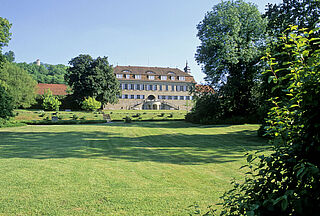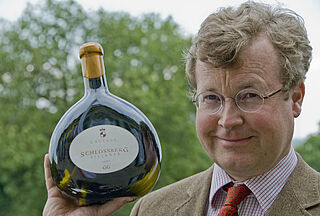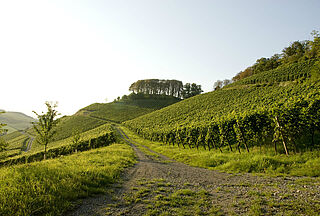Sevärdheter i vinregionerna
Castell: Cradle of a “Successful Experiment”
April 6, 1659 was a milestone in the history of the Franconian village of Castell: Johann Georg Körner, the bailiff of the Count of Castell’s estate, had new vines planted at the foot of the Schlossberg (literally, castle hill).
Not just any vines, but rather “25 ‘Austrian’ cuttings” that a messenger from the village of Obereisenheim had brought to Castell the day before – a fact documented in the extensive archives of the Fürstlich Castell’sches Domänenamt estate. The new plantings in the Schlossberg vineyard were used to fill the gaps left by vines that had succumbed to the ravages of the Thirty Years’ War and/or severe winter weather. This marked the beginning of the Silvaner grape’s triumphant advance throughout Germany, and particularly, Franken.
Silvaner numbers among the oldest grape varieties still cultivated today. In the first century, the Roman writer Pliny the Younger described a varietal with the same characteristics as Silvaner. In the 17th century, the grape reached Germany, probably from the Danube region, where it is assumed to have been cultivated by Cistercian monks in Ebrach, east of Würzburg. They are thought to have brought it from their sister monasteries in Austria to Obereisenheim. Silvaner was originally a crossing of Traminer and “Österreichisch-Weiss.” Given its Alpine origins, it was long known as “Österreicher” (literally, Austrian).
By 1659, the Castell dynasty had already been cultivating vines for more than 400 years. The earliest mention of vineyards was in 1224, when Castell deeded property to the monastery in Ebrach. Although the earliest documented mention of vineyards in Castell itself wasn’t until 1266, it is unlikely that the counts were not involved with viticulture earlier, since vines were literally being grown “on their doorstep” in the surrounding area. Franken’s vineyard area continued to expand; by the late Middle Ages, wine was the beverage of the common people and, of course, a means of paying the tithe in kind. It wasn’t until after 1600 that a small ice age considerably reduced grape yields and led to a series of crop failures.
However, these and other catastrophes paved the way for Silvaner. The Thirty Years’ War had laid waste to vast tracts of land and some 75 percent of the greater Franken area’s 40,000 hectares (ca. 99,000 acres) of vines were abandoned. This, combined with the climate change, led growers to seek grape varieties that could withstand winter frosts; varietals with later bud burst, i.e. able to survive spring frosts; and grapes that could ripen fairly quickly and reliably yield a good crop. Silvaner met all of these criteria.
Replanting vineyards with Silvaner was quite a “successful experiment” – so much so that in his standard work on viticulture in 1791, Johann Christian Fischer advised growers to plant every tenth vine with “Österreicher.” This must have encouraged many a grower to do so, for in 1833, pharmacist and viticultural pioneer Johann Philipp Bronner noted that Silvaner as ubiquitous as “salt in food.”
With the advent of planting parcels with just one variety rather than several (mixed) in the 19th century, Silvaner was able to expand its position as the ambassador of Franconian wine, where it was, and is, cultivated in top sites to produce the very finest wines. The Fürstlich Castell’sches Domänenamt is an estate that has nurtured this tradition to this day: of its 70 hectares (ca. 175 acres) of vines, some 40 percent are planted with Silvaner.
Contact
Fürstlich Castell’sches Domänenamt
Schlossplatz 5
97355 Castell
Phone : +49 9325 601-60
Fax : +49 9325 601-88
weingut[at]castell(dot)de
www.castell.de
Opening Time
Monday to Friday 8:00 a.m. to 6:00 p.m.
Saturday 10:00 a.m. to 4 p.m.
Recommendations for hotels and restaurants
Weinstall Castell
Schloßplatz 3
97355 Castell
Phone : +49 9325 98099-49
Fax : +49 9325 98099-48
info[at]weinstall-castell(dot)de
www.weinstall-castell.de
Gasthaus "zum Schwan"
Birklinger Straße 2
97355 Castell
Phone : +49 9325 901-33
Fax : +49 9325 901-34
info[at]schwan-castell(dot)de
www.schwan-castell.de
Zehntkeller Iphofen
Bahnhofstraße 12
97346 Iphofen
Phone : +49 9323 844-0
Fax : +49 9323 844-123
zehntkeller[at]romantikhotels(dot)com
www.zehntkeller.de




